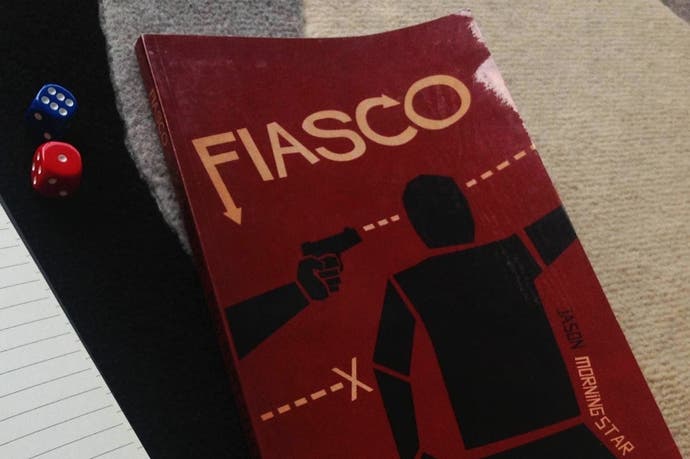Fiasco review
Criminally good fun.
Price: £15 book, $12 .pdf / Players: 3-5 / Time: 90 minutes
There are two things you should know about Fiasco (and you should know about Fiasco). The first is that it's the funniest game I've ever played.
As "a game of powerful ambition and poor impulse control," it sets out to simulate disastrous crime capers. If you've ever witnessed the downward spiral of films like Burn After Reading, In Bruges or Bottle Rocket, you'll know what to expect. My own games of Fiasco have seen me fretting over such miserable tasks as (i) trying to rob Holdenby Falconry Centre, with no knowledge of birds or, indeed, robbery and (ii) discovering my getaway car is a stick shift, which I couldn't drive, then fleeing the police in 1st gear.
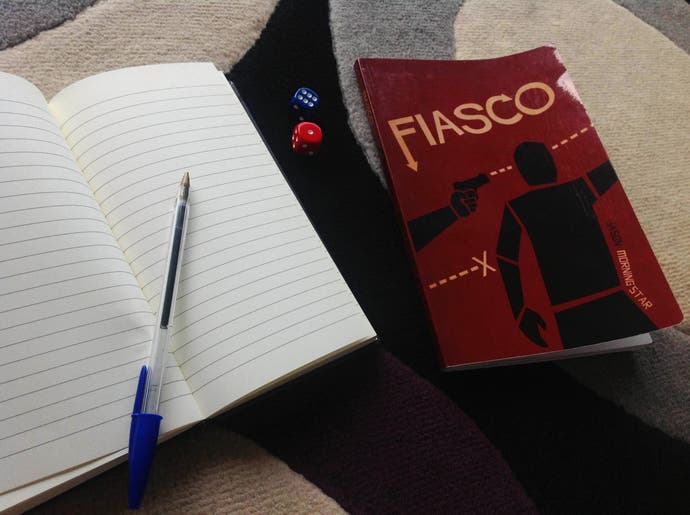
The second thing you should know about Fiasco is that it's a pen and paper role-playing game. Yes, like the original Dungeons & Dragons! Except not like that at all. You're still just paying for a slim little rulebook, and there are dice, but beyond that you'd be best off scorching all such comparisons from your mind.
Fiasco has ended up at the forefront of a great shift in role-playing. Sales of fat, luxurious role-playing source books, meant to create grand campaigns, have been trailing off for a while now. At the same time, smaller, independently-published books like Fiasco have been gaining attention. These "indie" RPGs are now something of a flavour of 21st-century hobby gaming. Many take just a single evening, and stranger still, many don't even require a "Gamesmaster". That'd be the omnipotent friend at the head of the table, consulting his arcane charts to tell you that your laser, in fact, glances off the Cyberspider and hits your friend in his *rolls dice* "balls."
Video games are now the domain of the RPG-as-simulation. But video games have one grand flaw, which is that they tend to tell us a story, and in doing so have paved over one of the great strengths of role-playing: absolute freedom, on behalf of the storyteller and the protagonists both.
Indie pen'n'paper games like Fiasco are letting you and your friends snap stories together with rules as flexible and satisfying as narrative Lego
Indie pen'n'paper games like Fiasco, then, are filling that gap, letting you and your friends snap stories together with rules as flexible and satisfying as narrative Lego. And there's no more entertaining way to get involved than with Fiasco, mostly due to its spectacular opening.
Firstly, your table of friends picks a "Playset", a wealth of which are now available online. This can be compared to browsing a menu of disaster. Do you want to be the employees at a crap zoo that could close down any day now? To swear your way through Guy Ritchie's gangland London? Do you want a disaster in the Arctic, to take your baggage on board the Titanic, to work at an Anchorman-like ego-powered news station? Take your pick!
Players then roll a huge pool of dice in the centre of the table, though you could just as easily write numbers on scraps of paper. You then simply take turns to assign "relationships" and "details" between one another. Look here:
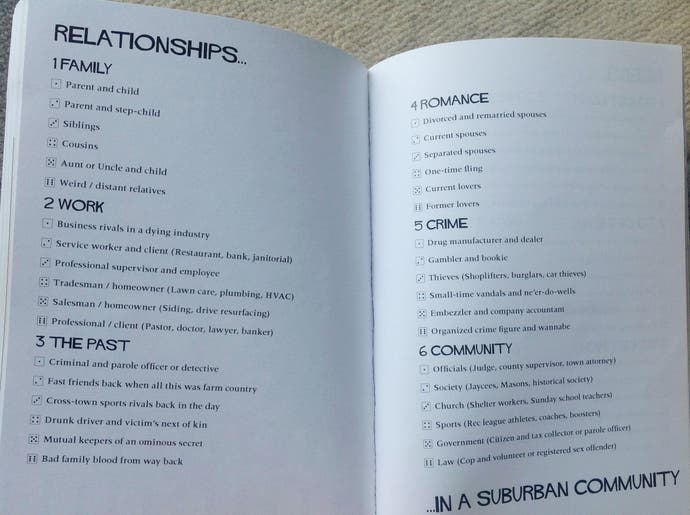
See how there are six categories of relationships? On your turn you take a die from the central pool then use that number to either create a category of relationship that links two people sat around the table, or finish it by picking something from that category. So, on your turn you might take a 4 to place a "Romance" relationship between two of your friends at the table, and on a later turn use a 3 to make their characters separated spouses.
Finally, once all the dice are gone, everyone puts their heads together to decide how this all makes sense. Et voilà: Your story takes place in the tiny Welsh town of Lampeter. Your friends are playing divorced spouses, the ex-husband drives an ice cream van, you're his biggest competitor in the ice cream van business, and his ex-wife wants to get rich by first rewriting his will.... and having you kill him. With this, Fiasco can boast my favourite achievement in table gaming: every time I've played it, with veteran role-players or not, every person has been laughing before the game's even started.
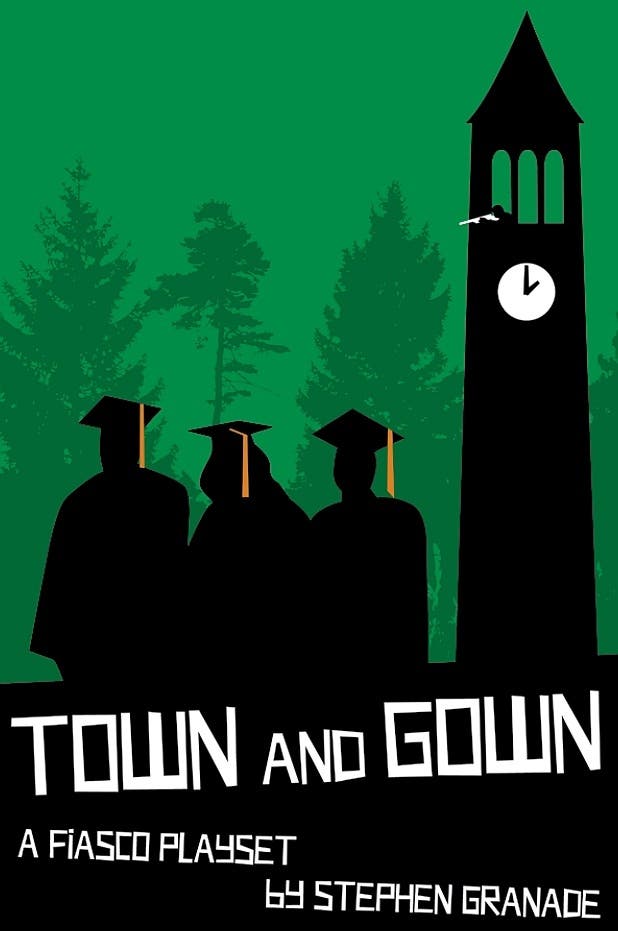
The game itself couldn't be simpler. Everyone at the table takes turns giving their character a "scene", probably relating to what their character wants. Other players can be in the scene as their characters, or they can be roped in as extras, bit parts, new characters, SFX guys. Whatever you want.
You can either set this scene up yourself, at which point the rest of the table can decide if it ends "well" or "badly" for your character, giving you either a white or black dice from the centre of the table. Or you can let them set up the scene, and decide for yourself if it ends "well" or "badly". The only twist is that only 50% of the dice in the game are white. Exactly half the scenes in Fiasco will go horribly wrong for the protagonist. Half will, inexplicably, work out for them.
It turns out, through mysterious table game magic, that this is exactly the formula required to make a botched heist movie. The white dice always set terrible wheels in motion and the black dice ensure those wheels fall off. Every. Single. Time. But mostly, the dice system works because when you're suddenly ordered to make a scene end "well" or "badly", the result is always entertaining, sometimes in and of itself. Let's say you're in the middle of a bizarre improv where you and a friend are losing your shit, trying to figure out how to disarm a home-made bomb. When the rest of the table silently slide you a black die, you're going to laugh.
All of this might sound a touch intimidating, but Fiasco isn't about improv, and it's definitely not about acting. It's about following a series of prompts, then working together to make something ridiculous. All you need is a willingness to have fun.
Let's say you decide a scene is that your friend has just parked his icce cream van opposite yours, and wants to try and intimidate you into leaving the street. "Oh my god," says a third player. "Let's have it that there are happy kids everywhere." Everyone agrees that this sounds funny, and suddenly you're playing two Welsh ice cream van men trying to threaten one another with violence without swearing or raising their voices. Perfect.
Fiasco's genius is in creating an RPG that permanently exists in the most memorable moments of the medium
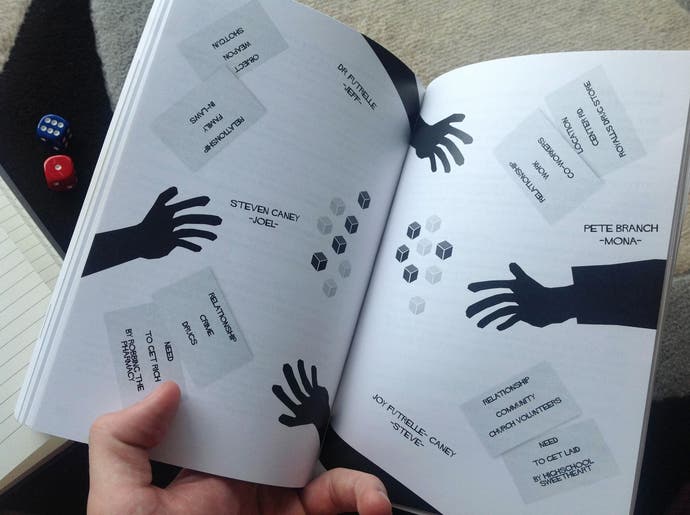
Fiasco's genius, really, is in creating an RPG that permanently exists in the most memorable moments of the medium. You create a funny scene. You enjoy it. Suddenly, it either goes horribly wrong or worryingly right, spiking the scene into a dramatic conclusion, and then it's over. Next funny scene. Of course, this can't last forever. But just as the story's properly left the rails - where someone's dead, someone's in jail, and someone's fleeing with everything they've ever wanted - the game ends and all that's left is to consult the most brutal chart in gaming.
In true Coen brothers fashion, if you have nothing but good luck or bad luck for the whole story, your character gets a happy ending. But if you're sat in front of a mix of black and white dice by the end? If you're a pathetic chancer, trying and failing to improve their lot? The good news is, you were probably the protagonist. The bad news is, the game's going to tell you that you ended up worse than you started.
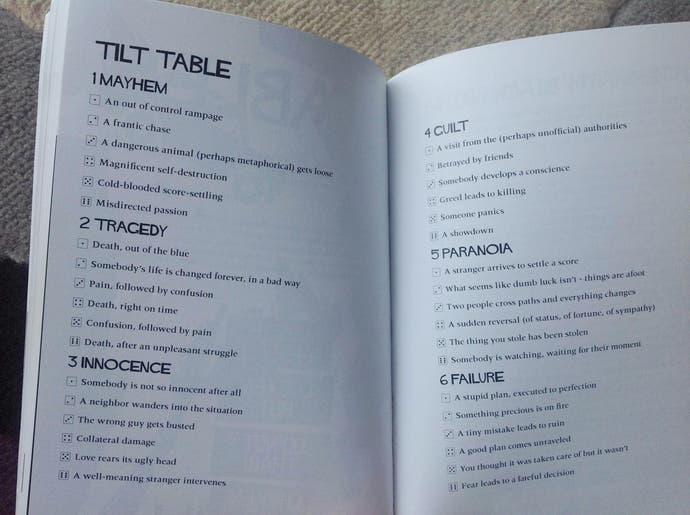
Or perhaps the miracle is that Fiasco feels like an important game and entirely absurd all at once. I mean, my favourite memory of it features me playing Southern teen Randy Pickens. I worked at a tanning salon and was hell-bent on getting my 40-something boss to come out of the closet and leave his wife for me. The scene in question: me, at his place, trying to help him "relax" during a Blu-Ray of James Cameron's Avatar, which was acted out at a quiet TV volume by two more of my friends. It was joyous.
But think about what we were doing there. Having fun with a story, characters and plot twists that we'd created ourselves. The RPG is reimagined as a collaborative multiplayer experience, and the disaster you invent, from its confused start through to its clean conclusion, is a unique story snowflake that you'll all share before it melts at the end of the night.
Everyone should try Fiasco. With a lot of board games, you might try them once then feel a quiet guilt that you haven't squeezed more evenings out of them. Not so with indie RPGs. At just $12 for the Fiasco .pdf, you'll be able to buy it, try it and see what you think of one of the most exciting developments in gaming - and feel good doing it.
Go on! Make a mess. I dare you.
Quintin is the editor of Shut Up & Sit Down, a board game review site. Visit it for more coverage of this strange cardboard realm.
